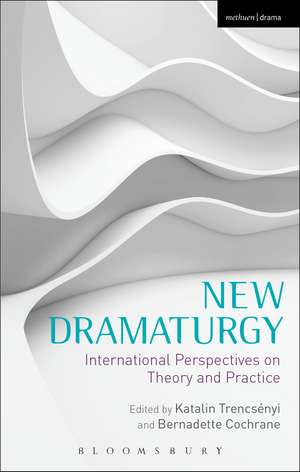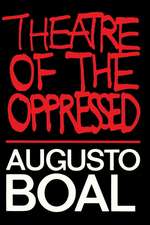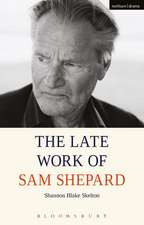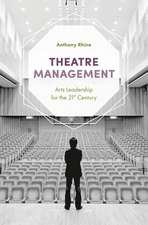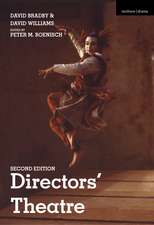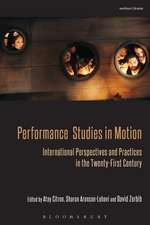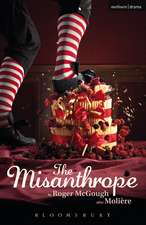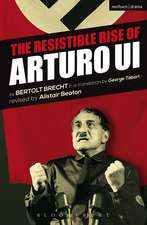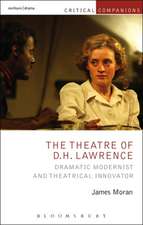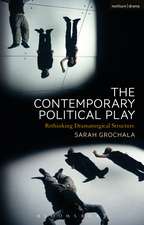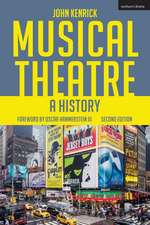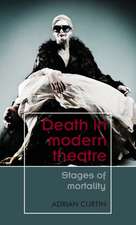New Dramaturgy: International Perspectives on Theory and Practice
Editat de Katalin Trencsényi, Bernadette Cochraneen Limba Engleză Paperback – 23 apr 2014
Preț: 219.18 lei
Preț vechi: 245.53 lei
-11% Nou
Puncte Express: 329
Preț estimativ în valută:
41.95€ • 43.23$ • 35.42£
41.95€ • 43.23$ • 35.42£
Carte tipărită la comandă
Livrare economică 03-17 martie
Preluare comenzi: 021 569.72.76
Specificații
ISBN-13: 9781408177082
ISBN-10: 1408177080
Pagini: 304
Ilustrații: 10 halftone illus
Dimensiuni: 138 x 216 x 20 mm
Greutate: 0.42 kg
Editura: Bloomsbury Publishing
Colecția Methuen Drama
Locul publicării:London, United Kingdom
ISBN-10: 1408177080
Pagini: 304
Ilustrații: 10 halftone illus
Dimensiuni: 138 x 216 x 20 mm
Greutate: 0.42 kg
Editura: Bloomsbury Publishing
Colecția Methuen Drama
Locul publicării:London, United Kingdom
Caracteristici
Its emphasis on practice-based studies from a very broad range of international contexts will appeal to readers wanting an authoritative insight into current and emerging practice
Notă biografică
Katalin Trencsényi is a London-based dramaturg. She completed her PhD in Philosophy (Aesthetics) at the Eötvös Loránd University, Budapest. As a freelance dramaturg, Katalin has worked with the National Theatre, the Royal Court Theatre, the Courtyard Theatre, Deafinitely Theatre, Corali Dance Company, and Company of Angels amongst others. Katalin co-founded the Dramaturgs' Network with Hanna Slättne in 2001, and has worked on its various committees ever since. From 2010 to 2012 Katalin served as President of the Dramaturgs' Network. Katalin is one of the contributors to the Routledge Companion to Dramaturgy (2014). Her monograph on contemporary dramaturgical practices, Dramaturgy in the Making, is to be published by Bloomsbury in 2015. Bernadette Cochrane is a Research Fellow at the University of Queensland. As a freelance director and dramaturg she has worked for several independent companies in both Australia and the United Kingdom. She co-convenes the Translation, Adaptation and Dramaturgy Working Group of the International Federation for Theatre Research. Bernadette has edited a special issue of the Journal of Adaptation in Film and Performance (2011, Vol. 4 No. 3), and has a chapter in Invisible Presences: Translation, Dramaturgy and Performance (2014). She has an article forthcoming considering the recently proliferating practice of screening live performances (primarily of opera, theatre, and dance) in cinemas, in the journal, Adaptation (2014).
Cuprins
Contents List of Illustrations Foreword New dramaturgy: A post-mimetic, intercultural, process-conscious paradigm Katalin Trencsényi and Bernadette Cochrane Acknowledgements Part 1 Towards a New Theory 1 Dramaturgy in 'Postdramatic ' Times Joseph Danan 2 Dramaturgy as Ecology: A Report from The Dramaturgies Project Peter Eckersall, Paul Monaghan and Melanie Beddie 3 Respect and Perspective: Art, Structure and Ownership Alan Lawrence Part 2 Text 4 Telling Stories Across Forms: Interview with Brian Quirt (artistic director, Nightswimming, Toronto) Yolanda Ferrato 5 Towards Performed Dramaturgy Duska Radosavljevic 6 Disruption as Revealing the Essence of Truth Gad Kaynar in conversation with Ruth Kanner Part 3 Devising 7 The Feeling of Devising: Emotion and Mind in the Devising Process Jackie Smart 8 ' A Way of Listening' : Interview with John Collins (artistic director, Elevator Repair Service, New York) Ana Pais 9 The Appliance of Science: Devising, Dramaturgy and the Alternative Science Play Alex Mermikides Part 4 Dance 10 Time and a Mirror: Towards a Hybrid Dramaturgy for Intercultural-Indigenous Performance Rachael Swain 11 Going 'Au-del à': A Journey into the Unknown. Reflections of a Choreographer and a Dramaturg Lou Cope and Koen Augustijnen with contributions from Annie Pui Ling Lok 12 Re-Membering Zero Degrees Guy Cools Part 5 Spectatorship 13 Porous Dramaturgy and the Pedestrian Cathy Turner 14 Dialectical Theatre and Devising: Dramaturgy as a Dialogue between the Author and the Audience Pedro Ilgenfritz 15 Acts of Spectating: The Dramaturgy of the Audience 's Experience in Contemporary Theatre Peter M. Boenisch Afterword In lieu of a conclusion Katalin Trencsényi and Bernadette Cochrane Notes Contributors Index
Recenzii
The broad range of perspectives on new dramaturgy presented in this book provides fertile ground for new thinking and will be a useful resource for scholars, dramaturgs, practitioners, and students alike.
In the foreword to their edited collection, Katalin Trencsenyi and Bernadette Cochrane explain the term 'New Dramaturgy' . defined as a flexible concept, ranging across diverse practices, acknowledging coexisting contradictory ideas and theories which combine three important characteristics: 'they are postmimetic, they embrace interculturalism and they are process-conscious' (p. xii, italics in original). Working from this premise, the volume presents fifteen essays by contributors . [that] can be divided into essays that focus heavily on a description of practice and essays that deal with dramaturgy on a more theoretical level.
There's something inordinately fascinating in the differing approaches of the practitioners, critics and academics in this book to the subject of 'New Dramaturgy', but rather than trying to iron out those creases, they are laid bare by association.
New Dramaturgy, edited by Katalin Trencsényi and Bernadette Cochraine, not only orientates the reader in the dramaturgical landscape of contemporary theatre, dance theatre, experimental theatre, and site specific theatre, but also demonstrates that the search for new paths, risk taking and experimentation is very much a defining element of the renewal of the art of theatre and performance.
In the foreword to their edited collection, Katalin Trencsenyi and Bernadette Cochrane explain the term 'New Dramaturgy' . defined as a flexible concept, ranging across diverse practices, acknowledging coexisting contradictory ideas and theories which combine three important characteristics: 'they are postmimetic, they embrace interculturalism and they are process-conscious' (p. xii, italics in original). Working from this premise, the volume presents fifteen essays by contributors . [that] can be divided into essays that focus heavily on a description of practice and essays that deal with dramaturgy on a more theoretical level.
There's something inordinately fascinating in the differing approaches of the practitioners, critics and academics in this book to the subject of 'New Dramaturgy', but rather than trying to iron out those creases, they are laid bare by association.
New Dramaturgy, edited by Katalin Trencsényi and Bernadette Cochraine, not only orientates the reader in the dramaturgical landscape of contemporary theatre, dance theatre, experimental theatre, and site specific theatre, but also demonstrates that the search for new paths, risk taking and experimentation is very much a defining element of the renewal of the art of theatre and performance.
